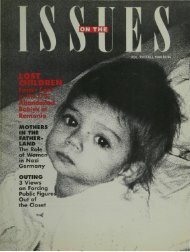I Am Beautiful: A Celebration of Women in Their Own Words
I Am Beautiful: A Celebration of Women in Their Own Words
I Am Beautiful: A Celebration of Women in Their Own Words
Create successful ePaper yourself
Turn your PDF publications into a flip-book with our unique Google optimized e-Paper software.
IN THE MEANTIME, SHE IS HELPINGto counsel elderly widows at aprogram run by the U.S.-basedInternational Rescue Committee. "Itry to give these women hope, evenif it is false," she says gently, "becausethat is what they want to hear.Everyone needs hope." Senada'ssalary is paid <strong>in</strong> food. Dur<strong>in</strong>g thewar, Bosnians who were fortunateenough to be employed usuallyworked for free or for food parcels.Today, an estimated 60-80 percent <strong>of</strong>city-dwellers are currently unemployed;<strong>in</strong> rural areas, the situationis worse.Psychological counsel<strong>in</strong>g is rarely available now because<strong>in</strong>ternational bodies, such as the United Nations andUSAID, that fund the humanitarian relief agencies have decidedthat it is no longer necessary <strong>in</strong> Bosnia. Instead, "reconstructionand reconciliation" are the current bywords <strong>of</strong>the <strong>in</strong>ternational donor community. There are many critics<strong>of</strong> this decision."The war didn't end with the Dayton Accord, not <strong>in</strong> ourheads. It isn't over just because you say it is over. It is afragile peace, as fragile as the most delicate porcela<strong>in</strong>," saysPr<strong>of</strong>essor Rado Boric, who used to teach languages (she isfluent <strong>in</strong> eleven) at Zagreb University. When the war brokeout Boric, a former Fulbright scholar at Indiana University,stopped teach<strong>in</strong>g to help run an <strong>in</strong>digenous humanitarianorganization, "<strong>Women</strong> for <strong>Women</strong> War Victims.""There is tremendous war trauma," she says. "People arefac<strong>in</strong>g reality for the first time. Mass graves are only nowbe<strong>in</strong>g excavated, people rema<strong>in</strong> miss<strong>in</strong>g, refugees want toreturn home but can't. The men are either dead or depressed,suffer<strong>in</strong>g from post-traumatic stress. Suicide is up,so is alcoholism, drug abuse and domestic abuse." So too isdivorce, hi Sarajevo alone, the rate is reportedly eight timeshigher than it was before the war. "Everybody has armsnow, so men are threaten<strong>in</strong>g women with weapons broughtfrom the battlefield," says Pr<strong>of</strong>essor Boric. "I know <strong>of</strong> acase just recently when a woman was locked <strong>in</strong> the bathroomby her husband, who placed hand-grenades outsidethe door, tell<strong>in</strong>g her she could not leave. He threatened todetonate them if she came out."By some estimates, it will take decades for Bosnia's psychicwounds to heal. Yet despite this, the UN and USAID aretell<strong>in</strong>g NGOs (non-governmental organizations) not to applyfor fund<strong>in</strong>g for psycho-social programs, says Boric. "They<strong>in</strong>form us, 'There is no longer any need for counsel<strong>in</strong>g <strong>of</strong>women. We don't fund it anymore.' As if say<strong>in</strong>g it makes theproblems go away. It's become almost a joke, except that itisn't. Such decisions are clearly made <strong>in</strong> a vacuum."Foreign 'experts' come here as consultants to study theproblem. Based on those brief visits, they decide the fashion<strong>of</strong> the day will now be X or Y. Right now, it is reconstructionand reconciliation. Recently, an <strong>of</strong>ficial fromUNHCR (the United Nations High Commission forRefugees) admitted to me that they were '<strong>in</strong>vent<strong>in</strong>g' whatthe next phase for fund<strong>in</strong>g would be, and that this iswrong. Why don't they ask us what we need, <strong>in</strong>stead <strong>of</strong>impos<strong>in</strong>g on us what they th<strong>in</strong>k we need?"One <strong>of</strong> Bosnia's resources is its large number<strong>of</strong> highly educated women. But more need toassert their rights: Last October, only onewoman was elected to parliament.Left, Halima Hadzijamakovk, head <strong>of</strong> Sarajevo'slargest municipality. Below, parliamentarianMediha Filipovic, M.D.Boric po<strong>in</strong>ts out that because<strong>of</strong> such attitudesdur<strong>in</strong>g the war, therefugees received, for example,vast quantities <strong>of</strong>tampons, for a culture thatdoes not use them. "Wehad warehouses full <strong>of</strong>them and no sanitary napk<strong>in</strong>s,which women reallyneeded. But then they alsosent us semen to <strong>in</strong>sem<strong>in</strong>atecows when hospitalsfor humans had no antibiotics."As one Bosnianpolitician put it, "When we needed a doctor, you sent us apriest. Now that the war has ended, and we need a priest,you send us a doctor." (A dramatic example <strong>of</strong> this is theU.S. refus<strong>in</strong>g to supply Bosnia with arms dur<strong>in</strong>g the war,but now that the fight<strong>in</strong>g is over, send<strong>in</strong>g them $400 million<strong>of</strong> weapons and the specialists to teach the Bosnianmilitary how to use them.)Maurice Cronly, who heads the British Charities AidFoundation, concurs with Boric. "UNHCR br<strong>in</strong>gs <strong>in</strong> consultants,who get paid $300 a day, to learn what Bosnianscould teach them. There are many highly educated menand women <strong>in</strong> the former Yugoslavia. This is not an underdevelopedAfrican nation." The former Yugoslavia is, <strong>of</strong>course, <strong>in</strong> the heart <strong>of</strong> Europe; Sarajevo is as close to Rome,as the crow flies, as Milan is. Education was stressed underthe socialist system for both sexes, and the country has proportionatelymore college graduates and postgraduatesthan many European countries, hi fact, by that same ratio,there are more technically qualified women eng<strong>in</strong>eers, architects,etc. <strong>in</strong> Bosnia, than there are <strong>in</strong> the U.S."One <strong>of</strong> our major resources is the very high level <strong>of</strong> educationhere," says Halima Hadzijamakovic, a 41-year-oldwoman economist who was elected the president <strong>of</strong> Sarajevo'slargest municipality the day before we met. "Rebuild<strong>in</strong>gBosnia will fall to women because so many lost theirhusbands. Fortunately, we have strong, very talentedwomen. But under socialism, we also had a cradle-to-gravementality. We now have to change that. We also need to developa free market economy to compete <strong>in</strong> the world."IF BOSNIA IS TO SURVIVE IN THIS POST-WAR ERA IT HAS SEVeralkey transitions to make: from war to peace, communismto democracy, and planned economy to a freemarketsystem. The Dayton Accord is far from ideal, call<strong>in</strong>gas it does for a triumvirate <strong>of</strong> Presidents to head the country,one from each ethnic group—Muslim, Croat, Serb. Ithas been likened to <strong>in</strong>sist<strong>in</strong>g that Cl<strong>in</strong>ton, Dole and Perotsit together <strong>in</strong> the Oval Office and simultaneously leadSpr<strong>in</strong>g 1997 • O N THE ISSUES 31
















